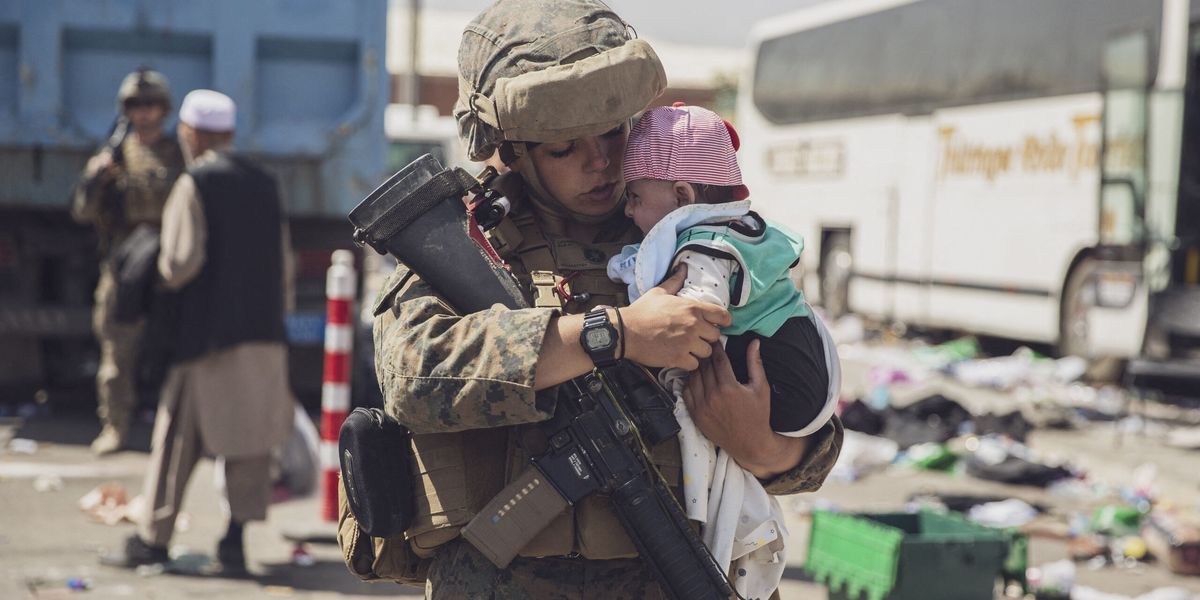On the three-year anniversary of the last U.S. soldier leaving Afghanistan, and with a presidential election looming, Afghanistan has briefly resurfaced in American discourse.
With a narrow focus on one month out of 238, and 13 deaths out of 2,219 American lives lost in Afghanistan, our leaders will once again miss the point. The spotlight will be on U.S. politics — not Afghanistan, not veterans, not Gold Star families, and certainly not Afghans. The goal is deflection, not reflection.
The harsh reality is that after 20 years our battlefield successes amounted to little. When the Trump administration entered negotiations with the Taliban, both Washington and our longtime Taliban adversaries shared the same goal: America out. President Biden soon decided to follow suit, leading to a haphazardly managed withdrawal—just another chapter in a poorly executed war strategy.
Lawmakers will fixate on the final moments because facing two decades of failure doesn’t suit them.
There are important questions that should be asked in regards to Washington’s failures in Afghanistan. Did we choose the wrong partners at the start? Was our distraction in Iraq fatal? Could we have negotiated with the Taliban sooner, or withdrawn in winter when the Taliban’s conquest of cities would have been harder? What if Bagram air base had been the final exit point, not Kabul? Why did we negotiate with the Taliban, offering them legitimacy and concessions, instead of simply leaving?
Why, after 20 years, did we fail to “know our enemy” or appreciate the intricacies of Afghanistan’s tribes and cultures? More importantly, could we have ever understood?
Some will call it a lost cause from the start — a view I understand, despite its simplicity. Others will misread the lessons to craft new intervention strategies, hoping to change history once again, albeit with better timing and execution.
Conducting after-action reviews of major U.S. military missions is both necessary and a duty. The Afghanistan War Commission and SIGAR are taking this seriously, with their findings available in public reports. Veteran journalists and analysts are also publishing books that tackle the toughest questions of our twenty-year war. However, these reports and books are unlikely to be read by those who cynically exploit our Afghan failures and the blood of U.S. soldiers for their own agendas. Whether these lessons are applied to future conflicts remains to be seen.
Listening to politicians, commentators, and retired generals, one might think the Afghanistan war was a smooth humanitarian mission, with no U.S. deaths until President Trump negotiated a withdrawal and President Biden carried it out. But that’s pure fiction.
Behind it all is a simple truth: Afghanistan was never as important to Americans as it was to the Taliban.
For Afghans and the Afghan diaspora, a bleak reality has set in: no one is coming. It’s the Taliban’s country now. Those Americans who supported staying in Afghanistan indefinitely will argue it has become hell for women — a truth backed by facts — and a hotbed of terrorism — a claim somewhat exaggerated.
They might say that, with more resolve, we could have “won” — a belief detached from reality. Supporters of the withdrawal will claim that, despite losing their freedoms, Afghans are better off with the violence reduced. Both attitudes miss the point entirely. We were never genuine or capable of shaping a future for Afghans.
Remarkably, the United States hasn’t disengaged from Afghanistan. Since August 2021, over $2 billion in humanitarian aid has been provided. While U.S. leaders have rejected the idea of supporting non-state actors to overthrow the Taliban, some Washington think tanks still advocate for it. A dedicated cadre of volunteers and government officials continue to facilitate the evacuation of Afghans who supported the United States.
Meanwhile, efforts have been made, within the limits of U.S. law, to protect Afghan assets and engage diplomatically with the new Taliban leaders. Perhaps Washington policymakers truly have learned from the past.
But with each passing year, Afghanistan will fade in importance, reduced to the status of a landlocked country with dwindling investment and moderate security risks, overshadowed by other global priorities.
Perhaps the harshest indictment of the 20-year war in Afghanistan is how little it will be discussed in the future. Each year, it will be briefly remembered on this day as a failure and then largely forgotten until the next anniversary.
- Six reasons the Afghan government utterly collapsed during US withdrawal ›
- Why the Afghan government collapsed after the US withdrawal ›
- Symposium: Was withdrawing from Afghanistan the right thing to do? ›
- The Taliban resistance lives on in the Lion of Panjshir's son | Responsible Statecraft ›















